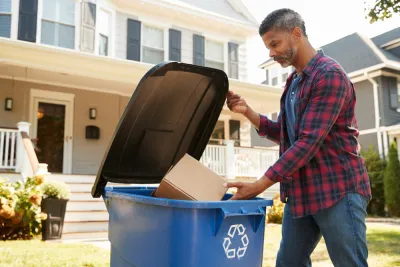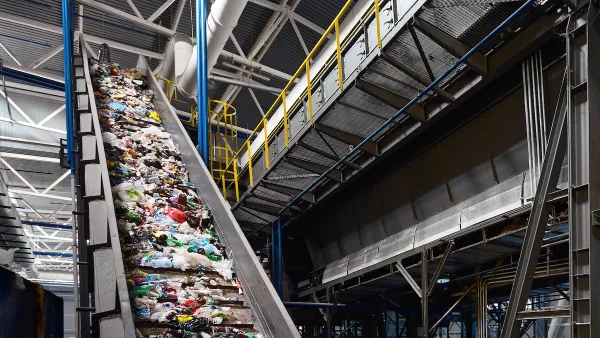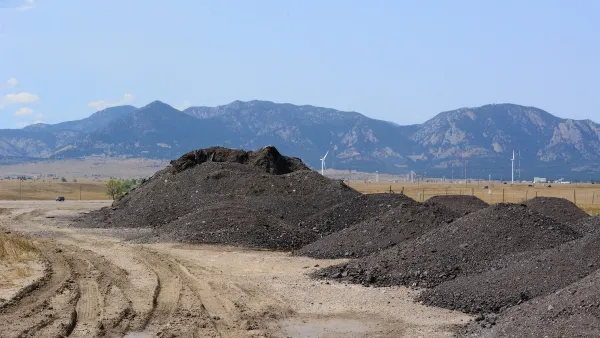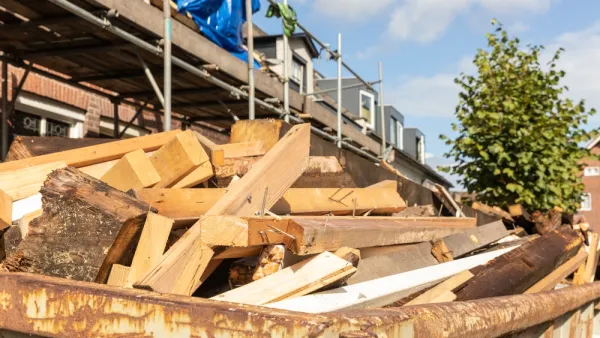In most residential areas across the United States, recycling is encouraged and offered as a way for residents to sustainably dispose of certain materials. But how many residents actually participate in their local recycling efforts?

In most residential areas across the United States, recycling is encouraged and offered as a way for residents to sustainably dispose of certain materials. But how many residents actually participate in their local recycling efforts?
As of 2018, the national recycling rate was just over 32 percent, which was less than the rate recorded in 2015. In cities, the numbers are becoming more concerning, specifically because China has stopped importing waste. Now, many cities have scaled back or completely eliminated their recycling efforts.
The one positive aspect to increased global restrictions on importing waste is that it exposes flaws in current recycling programs, giving cities a chance to improve their measures. Expanding access to recycling programs in urban areas is essential for various reasons. Learn more below.
Recycling’s Considerable Environmental and Cost Benefits
A city’s dense, populated spaces mean residents produce consistently large amounts of waste that require proper disposal. Seeking alternative measures to traditional waste removal techniques can help cities reduce their environmental impact and increase their cost savings. That’s where recycling comes in.
While recycling may not seem too beneficial on an individual level, it’s far and away a much more sustainable approach to waste removal than traditional methods. About 94 percent of the natural resources Americans use are non-renewable. Recycling saves non-renewable resources from landfills (like the 14 million used cell phones that end up in landfills annually) leading to increased energy savings.
Relatedly, recycling often leads to higher levels of cleanliness, crucial in urban areas. A more significant rate of recycling makes for cleaner air, tidier public areas, and cleaner waterways. This factor can drastically improve residents’ quality of life, especially when it comes to the promise of a more sustainable future.
When it comes to costs, the benefits are less obvious, but still present. In some cases, it can cost anywhere from $70 to $200 per ton to collect and dispose of waste. Well-managed recycling programs can cut that down to $50 to $150 per ton. When a properly run system is in place, cities can also limit how much they spend on managing landfills.
Though reduction and reuse approaches are more beneficial overall than recycling, it’s essential to note how prioritizing recycling in cities can bring many advantages.
How Urban Communities Can Achieve Recycling Accessibility
How can cities realize the many environmental and economic advantages of recycling? It’s all about accessibility. When recycling programs come with clear, easy-to-follow steps and are available for residents throughout the various boroughs and neighborhoods of a city, more people feel inclined to participate.
Arguably, the most effective way to increase access to recycling in a city is to offer curbside recycling pickup. In many cases, when recycling is left to the individual to gather, transport, and drop off, it becomes a significant and sometimes impossible task. This is especially true in urban locations. The landscape of a city is often incredibly diverse; residents have different incomes, housing conditions, and transportation methods. While it may be easy for one person to drive to a recycling center 30 minutes across the city, that option might not exist for someone who doesn’t have a car or has no time in their week to make that trek.
Therefore, coming to the resident is crucial. By offering that recycling pickup service alongside regular trash collection, residents will find it much easier to participate in their city’s recycling program. Providing adequate recycling bins for a small fee or free of charge also helps.
Overall, cities should make it a priority to consider all of the hurdles their residents face when it comes to recycling and other eco-friendly initiatives and work to address them.
Everyone Deserves an Accessible Way to Support the Planet
When cities offer the most convenient way feasible for their residents to partake in sustainable initiatives like recycling programs, they can expect to see increased participation numbers and will enjoy the environmental and cost benefits of such a program as well.

Analysis: Cybertruck Fatality Rate Far Exceeds That of Ford Pinto
The Tesla Cybertruck was recalled seven times last year.

National Parks Layoffs Will Cause Communities to Lose Billions
Thousands of essential park workers were laid off this week, just before the busy spring break season.

Retro-silient?: America’s First “Eco-burb,” The Woodlands Turns 50
A master-planned community north of Houston offers lessons on green infrastructure and resilient design, but falls short of its founder’s lofty affordability and walkability goals.

Test News Post 1
This is a summary

Analysis: Cybertruck Fatality Rate Far Exceeds That of Ford Pinto
The Tesla Cybertruck was recalled seven times last year.

Test News Headline 46
Test for the image on the front page.
Urban Design for Planners 1: Software Tools
This six-course series explores essential urban design concepts using open source software and equips planners with the tools they need to participate fully in the urban design process.
Planning for Universal Design
Learn the tools for implementing Universal Design in planning regulations.
EMC Planning Group, Inc.
Planetizen
Planetizen
Mpact (formerly Rail~Volution)
Great Falls Development Authority, Inc.
HUDs Office of Policy Development and Research
NYU Wagner Graduate School of Public Service





























